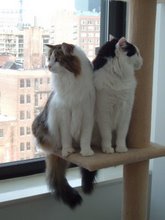The latest book to grace my iPod was Animal, Vegetable, Miracle by Barbara Kingsolver. Lately, my garden obsession has been spilling over into my taste in books. This book caught my eye when I saw it on the City of Chicago Read Green Live Green summer reading program shelf at the Borders. There were actually a lot of books on the Read Green Live Green list that looked good, but this one also happened to be on Audible, so it was my obvious choice.
The short of it: I loved this book. I'll probably keep it on my iPod and listen to it again in the future. The only downside to the book was the narration which I found to be too slow, tedious, and just down right annoying. I was a bit disheartened (or maybe I felt guilty?) when I realized that the narration that was driving me nutz--she reads REALLY slowly, like she's reading to a 5 year old--was done by the author herself. Oops. Despite this, I did really enjoy the book.
The longer story: This book follows Barbara Kingsolver and her family from their home in the desert southwest to a small farm in Virginia (or was it West Virginia??) and take on a year of eating almost 100% locally. Having the advantage of fertile soil and a decent growing season, they grow most of their food themselves. What they can't grow or make themselves, they buy from producers within 100 miles. They do cheat a bit, allowing a few non-local items (such as coffee and spices from fair trade sources in Africa.) I liked the fact they allowed themselves to "cheat" just a little bit. If they had gone a whole year without coffee, tea, or olive oil, I probably would been left feeling much more discouraged about the idea of trying this local eating thing myself.
As well as growing their own vegetables, they also "grow" their own eggs and poultry. This isn't the first book I've read that's described slaughtering a chicken, so it wasn't completely shocking to me. And, it is definitely true that the at-home slaughtering process is a lot less horrific to read about than what goes on in meat packing plants. However, her defense of meat eating was one time in this book--probably the only time--that I felt like her arguments fell a bit short. (Full disclosure: I'm vegetarian, I was Vegan for a few years too, so I have pretty set views about eating meat. I'm sure most people reading this blog will disagree with me and that's totally cool. I don't want to come off here as a veggie-Nazi type.) Anyway, her argument is: eating requires the destruction of life, be it an animal life or a plant life, its all life, and therefore if a person is vegetarian because they don't believe in taking a life,then they can't really eat veggies either. In a way, I actually agree with her. Plants are living things, yes, and harvesting them invovles them no longer continuing to live. However, she doesn't ever discuss the possible difference between a sentient being (animals) and those that aren't (plants) in terms of their ability to feel happiness, sadness, or pain. I'm vegetarian, and a lot of that is based on a distinction I make between the sentient and the non-sentient, but even I'm not entirely sure that this is a 100% valid distinction to make, BUT I think it would have been nice if she had at least talked about this a little.
The book and the writing style itself has a really good flow to it. When I picked out this book I had no idea who Barbara Kingsolver was or that she has written several other books before this one, I think mostly fiction, so I guess I didn't expect such a good story. The ending of the book is particularly good; who knew turkey reproduction could be such a nail biter!
So, yeah, this is a great read. If you want to learn more about growing food, preserving food, or eating locally, this is a great choice. If you're listening to the audio book, I hope you find her reading style more tolerable than I did.
My next read will be The End of Food by Paul Roberts which is also on the Read Green Live Green list. I'm looking forward to it! I can't get enough of this eating locally / food industry / gardening stuff.
Thanks for reading. :)
Announcement: My garden blog URL has changed. Click here to visit my new Dig-It-Yourself garden blog!
Latesst Posts From My Garden Blog
Subscribe to:
Post Comments (Atom)



Yay! I've got this out from the library right now, in my "to be read" stack. I'm really looking forward to it.
ReplyDeleteThey're not food books, but I highly, highly recommend two books by Elizabeth Royte: Garbage Land and Bottlemania. LOVED them both.
can i play devil's advocate and point out the possibilty that plants could be aware, and just totally unable to communicate that in any way we can see?
ReplyDeleteon the other hand, a great many veggies and fruits do not involved plant death at all. anything you pick, like peppers or an apple, still leave a live plant behind. carrots, though, are murder.
You need to read "The Secret Life of Plants". You will think differently about the ability of plants to feel pain. Naturally, it's up to you whether you take it with a grain of salt or not.
ReplyDeleteWhatever you ultimately think, it all boils down to feeling guilt. Guilt is not an animal or plant concept. Only human.